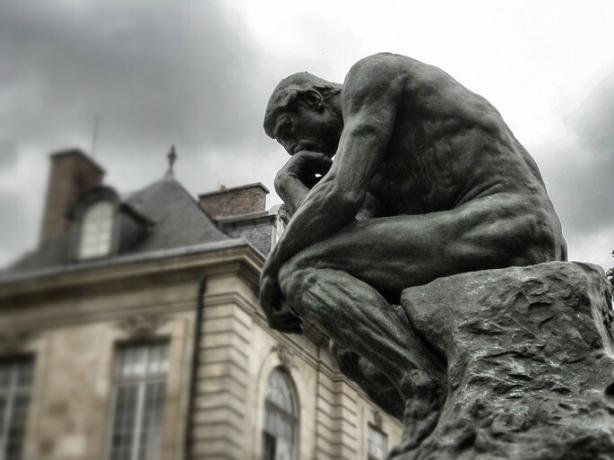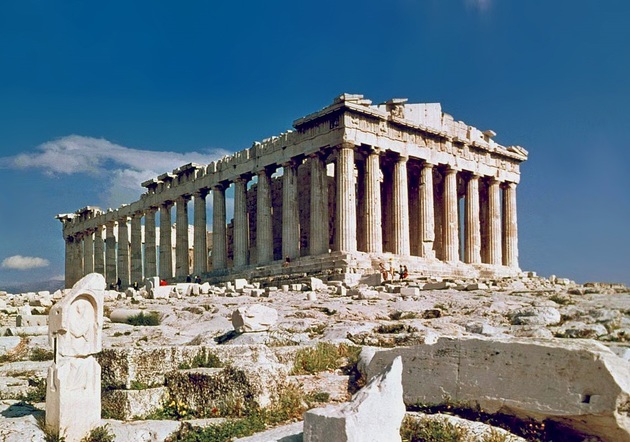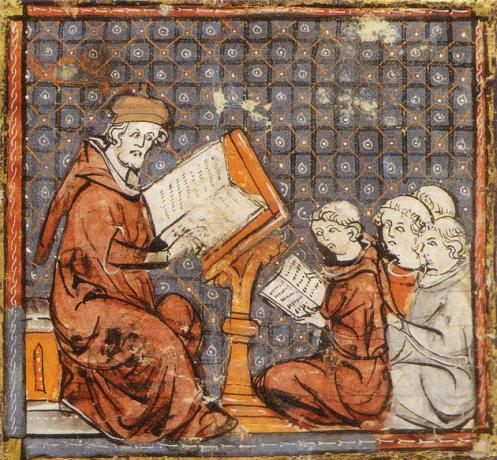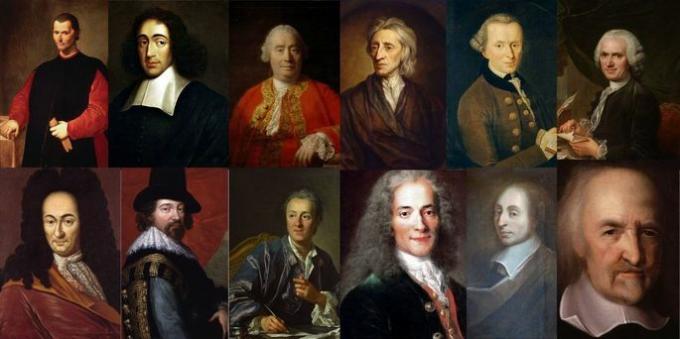Philosophy is a field of knowledge that studies human existence and knowledge through rational analysis. From the Greek, the term philosophy means “love of knowledge”.
According to philosopher Gilles Deleuze (1925-1995), philosophy is the discipline responsible for creating concepts.
the question of philosophy is the singular point where concept and creation refer to each other.” (Gilles Deleuze)
The main themes addressed by philosophy are: human existence and mind, knowledge, truth, moral values, language, etc.
The philosopher is considered a sage, being the one who reflects on these issues and seeks knowledge through philosophy.
Depending on the knowledge developed, philosophy has a range of currents and thoughts. Examples are: Christian, political, ontological, cosmological, ethical, empirical, metaphysical, epistemological, etc. philosophy.
Is it possible to define a concept of philosophy?
Different authors try to define the concept of philosophy, but there is no consensus or an exact definition of what philosophy essentially is.
Some attempts to define the concept:
- "The real philosophy is to relearn how to see the world." (Maurice Merleau-Ponty)
- "Philosophy seeks to make existence transparent to itself." (Karl Jaspers)
- "O philosophy, guide of life!" (Cicero)
- "Philosophy teaches to act, not to speak." (Seneca)
- "Science is what you know. Philosophy is what you don't know." (Bertrand Russell)
- "Philosophy is an arduous and difficult path, but it can be taken by everyone if they want freedom and happiness." (Baruch de Spinoza)
- "If you want true freedom, you must be a servant of philosophy." (Epicurus)
- "Philosophy is the battle between the enchantment of our intelligence through language." (Ludwig Wittgenstein)
- "To make fun of philosophy is actually to philosophize." (Blaise Pascal)
What is Philosophy for?

Through arguments that use reason and logic, philosophy seeks to understand human thought and knowledge developed by societies.
Philosophy was essential for the emergence of a critical attitude about the world and men.
In other words, the philosophical attitude is part of the life of all human beings who question their existence and also about the world and the universe.
So important, this field of knowledge became a mandatory subject in the school curriculum, as well as several faculties of philosophy were created.
See too:
- What is philosophy for?
- What is a philosophical attitude?
Origin of Philosophy

The philosophy begins in Antiquity, when city-states appeared in Ancient Greece. Before that, thought, human existence and the problems of the world were explained in a mythical way.
That is, the explanations were based on religion, mythology, the history of the gods and even on the phenomena of nature.
So, with the emergence of greek polis, the philosophers, who at the time were considered sent by the gods, began to investigate and systematize human thought.
With this, several questions arise, which until that moment had no such rational explanation. Mythical thinking gave way to rational and critical thinking, and from there came philosophy.
Did you know?
The terms “philosophy”, “philosopher” and “mathematics” were created by the Greek pre-Socratic philosopher Pythagoras. According to him:
“The philosopher does not own the truth, nor does he have all the knowledge of the world. He's just a person who is a friend of knowledge.”
Periods, Philosophical Currents and Main Philosophers
ancient philosophy

THE ancient philosophy arises in century VII a. Ç. in Ancient Greece. Greek philosophy is divided into three periods:
- Pre-Socratic Period (7th to 5th centuries a. Ç.);
- Socratic Period (5th to 4th century a. Ç.);
- Hellenistic Period (4th century a. Ç. to VI d. Ç.).
The main philosophical schools of this period were the Ionic School and the Eleata School or Italian School.
In the Ionian School, philosophers stand out:
- Miletus Tales (624-546 a. C.) - first philosopher, he also dedicated himself to mathematics, creating his famous theorem.
- heraclitus (540 a. C.-470 a. C.) - "philosopher of fire", he said that the world was in constant movement of transformation.
- Pythagoras (570-495 a. C.) - philosopher and mathematician, is recognized as the author of the term "philosophy" (love of knowledge).
- Anaximander (610-546 a. C.) - Important philosopher from Miletus, some of his observations on nature were confirmed by modern physics more than fifteen hundred years later.
- Anaximens (588-524 a. C.) - was the first person to affirm that the Moon reflected the light of the Sun, based his philosophy on the element of air as being the principle of all things.
At the Italian School (Escola Eleata), we have the philosophers:
- Parmenides (530-460 a. C.) - important Greek philosopher, responsible for the distinction between appearance and reality, affirmed the illusory character of the senses.
- Zeno (490-430 a. C) - following Parmenides' thinking, he created the idea of a paradox represented by the race between Achilles and the tortoise, in which Achilles never manages to reach it.
- empedocles (490-430 a. C.) - was the creator of the theory of the four elements (fire, water, earth and air) that lasted for centuries.
- Gorgias (485-380 a. C.) - the most famous of the sophists, he developed rhetoric (argumentation skill) and stated that the truth is just a matter of conviction.
Medieval Philosophy

THE Medieval Philosophy it developed in Europe between the 1st and 16th centuries. During this period, the theoretical foundations of Christian thought were built. The union between faith and reason is the hallmark of this philosophy.
It was divided into four periods:
- Philosophy of the Apostolic Fathers (1st and 2nd centuries);
- Philosophy of the Apological Fathers (3rd and 4th centuries);
- Patristic Philosophy (4th to 8th century);
- Scholastic Philosophy (9th to 16th century).
In the Philosophy of the Apostolic Fathers, the philosopher Paul of Tarsus stands out. In the Philosophy of the Apological Fathers, philosophers stand out: Justin Martyr, Origen of Alexandria and Tertullian.
In Patristic Philosophy, the greatest representative of this period was St. Augustine of Hippo (354-430).
Finally, in Scholastic Philosophy we have Saint Thomas Aquinas (1225-1274) as the most important philosopher.
modern philosophy

THE modern philosophy it developed between the 15th and 18th centuries. René Descartes (1596-1650) is considered the founder of modern philosophy with the creation of the Cartesian method.
It is the period of the emergence of science as it is understood today. The establishment of reason as capable of giving answers to human questions.
The main philosophical currents of this period were: Humanism, Scientism, Rationalism, Empiricism and Enlightenment.
Some modern philosophers are:
- Nicholas Machiavelli (1469-1527) - author of the book The prince, created the distinction between the morals of the State and the morals of the common individual. The expression "Machiavellian" as a synonym for something calculated and perverse, is based on the thought built in your book.
- Michel de Montaigne (1533-1592) - French philosopher, dedicated to questioning human behavior and education.
- Francis Bacon (1561-1626)-is considered one of the fathers of modern science, his thought was the basis for the development of empirical knowledge.
- Immanuel Kant (1724-1804) - Prussian philosopher, creator of transcendental idealism, sought to unite rationalist and empiricist philosophy. His thinking is understood as one of the great landmarks of modern philosophy.
- Montesquieu (1689-1755)-he is the great advocate of the tripartition of power (executive, legislative and judiciary) as a way to guarantee a fairer political system.
- Rousseau (1712-1778) - Enlightenment philosopher, stated that the human being is naturally good (good savage) and society and its institutions corrupt him.
- Voltaire (1694-1778) - was one of the forerunners of the idea of freedom of expression, criticized the absolutist power and the influence of the Catholic Church on politics and individual freedoms.
- Denis Diderot (1713-1784) - pioneer philosopher of scientific materialism. It sought to substantiate atheism and anarchism.
- Thomas Hobbes (1588-1679) - author of the sentence that states that the man is man's wolf. Your book Leviathan it is an important landmark of modern thought, it asserts that society is greater than the sum of its individuals.
- John Locke (1632-1704) - his thinking about the natural right to property served as the basis for liberalism.
- Spinoza (1632-1677) - his critique of traditional thinking about God stated that for divine perfection it was necessary to abandon the idea of a God persona (God with human attributes) and assume the idea of God as nature (god sive nature). This thought of his led him to two processes of excommunication (Christianity and Judaism).
Contemporary Philosophy

THE Contemporary Philosophy it developed between the 18th and 20th centuries.
The Frankfurt School, created in 1920 in Germany, deserves to be highlighted. Its main philosophers are:
- Theodor Adorno (1903-1969) - devoted himself to the study of aesthetics, was a great critic of positivism and the cultural industry developed by the capitalist system.
- Max Horkheimer (1895-1973) - critic of the philosophical tradition, he developed several contributions about dialectical materialism initiated by Marxist thought.
- Walter Benjamin (1892-1940) - is the great name of the Frankfurt School when it comes to studies on communication, mass culture and cultural industry.
The Frankfurt School was responsible for criticizing modern thought and creating foundations for thought developed in the 20th century.
During this period, many philosophical currents were developed:
- Marxism - socioeconomic analysis based on the thinking of the German philosopher Karl Marx. Its main foundation is the division of society into two antagonistic classes (class struggle): the bourgeoisie and the working class.
- Positivism - current of thought based on the thought of Auguste Comte. It presupposes the use of values based strictly on scientific knowledge.
- Utilitarianism - philosophical doctrine based on the idea of usefulness of human actions. These actions must be based on the idea of maximum production of well-being and happiness.
- Pragmatism - a school that states that concepts are anchored in their relationship with practice, how they are used and, from there, understood.
- Scientism - term used for the idea of solving practical problems through the scientific method.
- Phenomenology - current that affirms that the comprehension of reality is given from "consciousness phenomena" and only then can they be transformed into experience.
- Nihilism - current of thought that denies or questions the existence of things and social institutions.
- Existentialism - philosophical current that has different conceptions and concepts. It is based on the idea that the individual gives meaning to his own existence, with no essence that pre-determines the human being.
- Materialism - thinking that is based on the conception that all reality is inscribed in material relations.
- structuralism - current of thought that understands that the interpretation of reality depends on structures of relationships that define them.
In addition to the Frankfurt School philosophers, the following deserve mention:
- Michel Foucault (1926-1984) - French philosopher, studied the forms of control from institutions and their transition from discipline to surveillance.
- Friedrich Nietzsche (1844-1900) - German philosopher, critic of Christian morality, he is the phrase that affirms that God is dead.
- Karl Marx (1818-1883) - German thinker founded the foundations of socialism that served as theoretical guidance for the Russian Revolution of 1917. His thought was also fundamental to the development of the Frankfurt School and the criticisms of the postmodern capitalist system.
- Jean-Paul Sartre (1905-1980) - French existentialist philosopher known for his social criticism and for dedicating himself to the study of human existence. His is the phrase that states that human beings are doomed to be free.
- Auguste Comte (1798-1857) - creator of the positivist philosophy. It played a fundamental role in the advancement of human sciences. The motto of the Brazilian national flag was extracted from his thinking: "order and progress".
- Martin Heidegger (1889-1976) - German philosopher, founded existentialism based on his concept of being-in-the-world (dasein). It was widely criticized for joining the Nazi party before World War II.
- Ludwig Wittgenstein (1889-1951) - British naturalized Austrian philosopher, is one of the founders of the philosophy of language. Your book Tractatus Logico-Philosophicus was written during his participation in front in World War I.
- Arthur Schopenhauer (1788-1860) - German thinker known as the "philosopher of pessimism", Schopenhauer argued that suffering is an inherent condition of human life.
- Zygmunt Bauman (1925-2017) - one of the greatest thinkers of the second half of the 20th century and the beginning of the 21st century. He stated that the solidity of modern structures had given way to the liquidity of the new times in which human relations were characterized by inconsistency and instability.
Phrases of Philosophers
Check below some phrases from philosophers about the concept of philosophy:
- “Admiration is inherent in the philosopher's nature; and philosophy derives only from astonishment.” (Plato)
- “If you want true freedom, you must become a servant of philosophy.” (Epicurus)
- “Superstition sets the world on fire, philosophy puts them out.” (Voltaire)
- “You don't teach philosophy, you teach philosophizing”. (Kant)
- “A little philosophy leads the human mind to atheism, but the depth of philosophy leads it to religion.” (Bacon)
- “The trick of philosophy is to start with something so simple that no one finds it worthy of notice and end with something so complex that no one understands..” (Bertrand Russell)
- “Philosophy is what distinguishes us from savages and barbarians; the nations are the more civilized and cultured the better they philosophize their men.” (Discards)
- “In philosophy we have a very pleasant medicine, because in others we feel well-being only after the cure; this is good and cures at the same time.” (Michel de Montaigne)
- “Man's first reasoning is of a sensitive nature... our first philosophy masters are our feet, our hands, our eyes.” (Rousseau)
- “Philosophy is the art of forming, inventing, manufacturing concepts... The philosopher is the friend of the concept, he is a potential concept... Creating ever-new concepts is the object of philosophy.” (Deleuze and Guattari)
Did you know?
On November 15th, World Philosophy Day is celebrated.
General Knowledge Quiz
Test your knowledge with the quiz below!
Read too: What is history?
